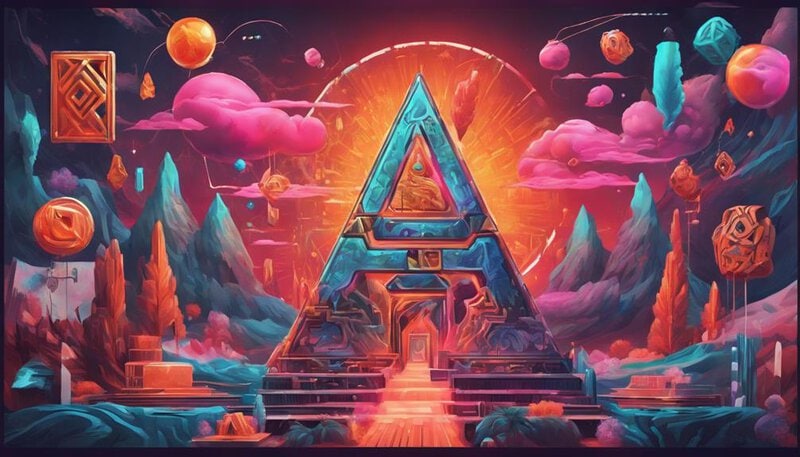Do NFTs Represent the Future of Digital Ownership?

These assets can be anything from digital art to virtual real estate, and they are bought and sold using cryptocurrencies like Ethereum.
NFTs have gained popularity in the art world, with digital artists selling their work for millions of dollars.
However, critics raise concerns about the environmental impact of NFTs due to the energy-intensive process of minting and trading them.
Understanding NFTs and Their Significance
In the realm of digital assets, NFTs stand as a revolutionary concept, reshaping the very essence of ownership in the virtual world. NFTs, or Non-Fungible Tokens, represent a pivotal advancement in the digital revolution, made possible through the ingenious application of Blockchain technology. Through Blockchain, each NFT is unique, irreplaceable, and securely stored, offering new possibilities for creators and collectors alike.
By leveraging Blockchain technology, NFTs provide a transparent and decentralized way of verifying ownership and authenticity, ensuring that digital assets can be truly one-of-a-kind. This innovation opens doors to a myriad of opportunities, allowing creators to tokenize their work and collectors to own exclusive digital items with absolute certainty of their provenance.
The significance of NFTs lies not only in their technical intricacies but also in the profound shift they bring to the concept of ownership in the virtual space. Embracing NFTs means embracing a future where digital assets are more than just ephemeral files—they become tangible representations of creativity, authenticity, and value in the ever-evolving landscape of the digital world.
Key Characteristics of NFTs
Behold the defining features that set NFTs apart in the realm of digital assets.
- NFTs and authenticity: Unlike traditional digital assets, non-fungible tokens provide a unique digital certificate of ownership. This certificate is stored securely on the blockchain, ensuring the authenticity and provenance of the digital asset.
- NFTs and digital scarcity: Another key characteristic of NFTs is their inherent scarcity. Each NFT is one-of-a-kind or part of a limited collection, making them highly sought after by collectors and investors. This digital scarcity adds tangible value to NFTs, much like rare physical items in the real world.
- NFTs and creative ownership: NFTs revolutionize the concept of ownership in the digital age. With NFTs, creators can retain ownership rights and even earn royalties every time their digital asset is sold or traded. This shift empowers artists, musicians, and other creators to monetize their work directly, bypassing traditional intermediaries.
In essence, NFTs offer a novel way to establish authenticity, create digital scarcity, and redefine ownership in the ever-evolving landscape of digital assets.
NFTs Vs Traditional Digital Assets

You stand at the crossroads of digital ownership, contemplating the distinct paths of NFTs and traditional assets.
NFTs offer a realm of unique ownership, where each digital asset stands as a one-of-a-kind creation.
In contrast, traditional digital assets face the looming risk of replication, diluting their value and exclusivity.
NFTs Unique Ownership
Possessing an NFT grants a level of exclusivity and individuality that sets it apart from traditional digital assets in the realm of digital ownership. NFTs derive their uniqueness from the blockchain technology that underpins them, providing each token with distinct attributes that can't be replicated.
Here are three key distinctions that highlight the unique ownership experience offered by NFTs:
- Token Uniqueness: Each NFT is one-of-a-kind, carrying specific metadata that distinguishes it from any other token in existence.
- Digital Scarcity: NFTs can be created to be inherently scarce, mimicking the scarcity found in the physical world and increasing their perceived value.
- Immutable Ownership: The blockchain ensures transparent and secure ownership records, safeguarding the authenticity and provenance of NFTs.
Traditional Assets Replication Risk
In the realm of digital ownership, the risk of replication poses a significant challenge when comparing NFTs to traditional digital assets. When conducting a risk assessment, it becomes evident that traditional digital assets are more vulnerable to replication due to their fungible nature.
Unlike NFTs, which are unique and indivisible, traditional digital assets can be easily duplicated without any distinction between the original and the copy. This replication risk raises concerns about asset protection, as it becomes harder to ensure authenticity and value preservation with traditional digital assets.
Therefore, in the evolving landscape of digital ownership, considering the implications of replication risk is crucial for individuals and entities seeking to safeguard the integrity and uniqueness of their digital assets.
Impact of NFTs on Ownership Rights
As the digital landscape evolves, the emergence of NFTs has significantly reshaped the concept of ownership rights. NFTs, or non-fungible tokens, have brought a new dimension to ownership in the digital revolution. Here's how they impact ownership rights:
- Unique Ownership: NFTs provide indisputable proof of ownership for digital assets, allowing individuals to truly possess one-of-a-kind items in the digital realm.
- Decentralization of Ownership: By utilizing blockchain technology, NFTs enable decentralized ownership, removing the need for intermediaries and giving individuals direct control over their assets.
- Expanding Ownership Boundaries: NFTs have expanded the scope of ownership to include digital art, virtual real estate, and even tweets, broadening the definition of what can be owned and creating new opportunities for creators and collectors alike.
The impact of NFTs on ownership rights is profound, offering a glimpse into a future where ownership is more secure, decentralized, and diverse.
Challenges and Controversies Surrounding NFTs

Navigating the realm of NFTs unveils a landscape fraught with challenges and controversies that demand thoughtful consideration. In the world of digital ownership, ethical implications loom large. The concept of owning a unique digital asset raises questions about environmental impacts due to the energy-intensive processes involved in minting NFTs. Moreover, concerns over copyright infringement and intellectual property rights have surfaced, leading to debates on how NFTs should be regulated to protect creators and buyers alike.
Market speculation adds another layer of complexity to the NFT landscape. The volatile nature of the market has led to instances of price manipulation and scams, highlighting the importance of due diligence before engaging in NFT transactions. The hype surrounding NFTs has attracted both genuine enthusiasts and opportunistic actors looking to capitalize on the trend, further blurring the lines between authentic value and mere speculation.
In navigating these challenges and controversies, it's essential to approach the world of NFTs with a discerning eye, mindful of the ethical implications and market uncertainties that shape this emerging digital frontier.
NFTs in the Art and Entertainment Industry
As you explore the role of NFTs in the art and entertainment industry, consider their profound impact on the artistic value of digital creations and the empowerment of creators. NFTs have revolutionized how artists can monetize and authenticate their work, offering new possibilities for ownership and revenue streams.
Artistic Value of NFTs
Exploring the profound impact of NFTs on the art and entertainment industry unveils a new frontier where digital ownership intersects with artistic value. NFTs are reshaping the perception of art by adding a new layer of value beyond traditional forms. Here are three key points to consider:
- Monetary Value: NFTs have introduced a new way for artists to monetize their creations directly, bypassing intermediaries and potentially increasing their earnings.
- Cultural Significance: NFTs are revolutionizing how we perceive ownership and authenticity in the digital realm, sparking conversations about the essence of art itself.
- Innovation in Expression: Artists are exploring new mediums and formats, pushing the boundaries of creativity and engaging with audiences in novel ways.
In this era of NFTs, the fusion of digital ownership and artistic value is paving the way for a reimagined art landscape.
Impact on Creators
Creators immersed in the realm of NFTs within the art and entertainment industry are witnessing a transformative shift in how their work is valued and disseminated. This shift extends beyond mere ownership; it delves into the very essence of creative autonomy.
NFTs empower artists to retain control over their digital creations, allowing them to monetize their work directly through blockchain technology. By embracing NFTs, creators can explore innovative monetization strategies, such as selling limited editions or royalties tied to their art's resale.
This newfound freedom not only revolutionizes the way artists interact with their audience but also opens up a world of possibilities for sustainable income streams. Embrace this evolution, for it heralds a future where creators can thrive through their art like never before.
NFTs in the World of Collectibles

Delve into the realm of digital collectibles with NFTs, where unique tokens revolutionize ownership in the world of art, gaming, and beyond. Embracing digital scarcity through blockchain technology, NFTs are reshaping the landscape of collectibles by offering unparalleled opportunities for both creators and collectors.
- Authenticity: NFTs provide a secure and transparent way to verify the authenticity of digital collectibles, ensuring that each item is truly one-of-a-kind.
- Ownership Rights: With NFTs, collectors gain true ownership rights over their digital assets, allowing them to buy, sell, or trade with ease and confidence.
- Diversification of Collectibles: NFTs open doors to a vast array of collectibles beyond traditional art, including virtual real estate, in-game items, and even tweets, catering to a diverse range of interests and passions.
In this digital age, NFTs offer a glimpse into the future of collectibles, where ownership is redefined, creativity flourishes, and the boundaries of traditional collectibles are transcended. Explore this exciting realm where innovation meets passion, and where every token holds the promise of a unique and valuable experience.
The Future Outlook for NFTs
In envisioning the trajectory of NFTs, consider the evolving landscape of digital ownership and the innovative possibilities that lie ahead. The future outlook for NFTs is fascinating, with promising trends and technological advancements paving the way for exciting developments. As the digital world continues to expand and evolve, NFTs are poised to play a significant role in reshaping how we perceive and interact with digital assets.
One of the future trends we can anticipate is the increased integration of NFTs into various industries beyond art and collectibles. From music and gaming to real estate and identity verification, NFTs have the potential to revolutionize the way we authenticate and exchange digital assets. Moreover, technological advancements such as improved scalability, interoperability, and sustainability will further enhance the utility and accessibility of NFTs, making them more mainstream and user-friendly.
In embracing these future trends and technological advancements, the realm of NFTs is set to become even more dynamic and influential in the digital landscape. Stay attuned to the evolving possibilities, as NFTs continue to shape the future of digital ownership.
Frequently Asked Questions
How Do NFTs Impact the Environmental Sustainability of Digital Ownership?
When considering how NFTs affect the environmental sustainability of digital ownership, it's crucial to acknowledge the energy consumption associated with blockchain technology. Understanding this impact is vital for making informed decisions about the future of digital assets.
Can NFTs Be Used as Collateral for Loans or Other Financial Transactions?
When considering NFTs as collateral for financial transactions, it's crucial to evaluate their volatility and market acceptance. Understanding the risks and benefits of leveraging NFTs can provide opportunities for innovative and secure lending practices.
Are There Any Regulations or Legal Frameworks Surrounding the Trading and Ownership of Nfts?
Navigating the world of NFTs can be complex due to regulatory challenges and legal implications. It's crucial to stay informed and seek guidance to ensure compliance and protect your interests in this evolving landscape.
How Do NFTs Affect the Concept of Provenance and Authentication in the Art World?
In the art market, blockchain technology embedded in NFTs revolutionizes provenance and authentication. Embrace the transparency and security these digital assets offer. Witness an era where ownership and history intertwine seamlessly, shaping art's future.
What Are the Potential Implications of NFTs on Copyright and Intellectual Property Rights?
When considering copyright implications and IP protection in the realm of NFTs, it's crucial to navigate the evolving landscape with care. Understanding these implications can empower you to safeguard your creations and rights effectively.








